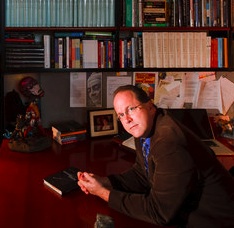<a href=”http://www.nytimes.com/imagepages/2010/11/13/BELIEFS.html”> After months of delays and excuses, I finally got around to doing an interview with Jeffrey Kripal, a religion professor at Rice University. It’s now up at The Immanent Frame. He’s one of the great oddballs in the study of religion today, about whom grad students whisper to each other, “It’s like he actually believes in this stuff!” More or less. And in the course of dismaying colleagues with his conclusions, he picks the kinds of subjects that other scholars of religion today need to be studying, but for one reason or another don’t. (Take a look at Mark Oppenheimer’s recent piece about him in The New York Times.) His most recent books are Esalen: America and the Religion of No Religion, a study of the important spiritual retreat center atop Big Sur, and, now, Authors of the Impossible. We spoke about the latter. It’s an account of four under-appreciated masters of the paranormal, men who sought after ways of understanding the unexplainable: psychic powers, UFOs, superhuman powers, and so on.
After months of delays and excuses, I finally got around to doing an interview with Jeffrey Kripal, a religion professor at Rice University. It’s now up at The Immanent Frame. He’s one of the great oddballs in the study of religion today, about whom grad students whisper to each other, “It’s like he actually believes in this stuff!” More or less. And in the course of dismaying colleagues with his conclusions, he picks the kinds of subjects that other scholars of religion today need to be studying, but for one reason or another don’t. (Take a look at Mark Oppenheimer’s recent piece about him in The New York Times.) His most recent books are Esalen: America and the Religion of No Religion, a study of the important spiritual retreat center atop Big Sur, and, now, Authors of the Impossible. We spoke about the latter. It’s an account of four under-appreciated masters of the paranormal, men who sought after ways of understanding the unexplainable: psychic powers, UFOs, superhuman powers, and so on.
NS: Should I expect some kind of evasion if I were to ask what you really believe?
JK: I don’t believe anything. And I believe everything. I am not being evasive or cute here. I am being precise. I don’t believe anything, in the sense that I think religious experiences are symbolic or semiotic—speakings across a gap, as it were—and so should not be taken literally, ever. I believe everything, in the sense that I think that extreme religious experiences express, through image, symbol, and myth, some revelation of the real, some very dramatic contact with the sacred, always, of course, filtered and constructed through the body-brain in a particular place and time.
NS: But what, then, counts as real? What are we dealing with here, behind the symbols?
JK: I suspect that we are. But who is this “we”? That is the deepest question we can ask, I think. If there is anything I believe, it is that we are not who we think we are. “Mind” or “consciousness” is not some neurological froth or emergent property of the computer brain, much less some ethnic or religious ego. Rather, it is a non-spatial, non-temporal presence of proportions so vast and so fantastic that there is really no way to exaggerate it, and there is certainly no way to “explain” it with either the absolute contextualist and relativist epistemologies of the humanities or the objectivist epistemologies and naïve realisms of the sciences. Basically, I am suggesting that the human form is a hidden presence of truly mythological proportions. A recent dissertation, by Jason Kelly at the University of Ottawa, has attempted to capture my thought under my own early rubric of “mystical humanism.” I accept that. Everything religious can indeed be reduced to the human, but it turns out that the human is not at all what we thought. That is very close to “what I believe.”
The real marvel of Kripal’s book, and what makes it the rare scholarly monograph that you really can’t put down, is the way in which it is above all a meditation on, and an experiment with, fantastic writing. There’s going to be a movie version too.